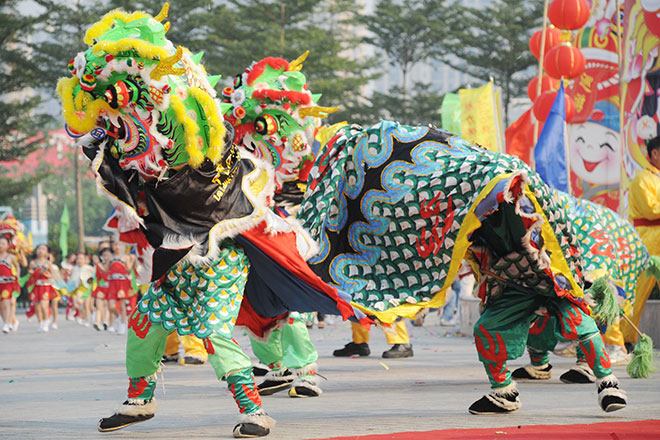Winter is a time for lunar celebrations in B.C.

Fortune and food part of Lunar New Year and Nisga'a First Nation celebrations
'If you shoot for the stars and hit the moon, it's OK. But you've got to shoot for something. A lot of people don't even shoot.'
– Confucius, Chinese teacher, editor, philosopher, and politician.
For many Asian communities, the Lunar New Year on January 22 is cause for celebration. It's such a major cultural tradition that in China, there's a seven-day public holiday for what's called the Spring Festival.
And for the Nisga'a First Nation, February 21 is Hobiyee, a celebration of the emergence of the first crescent moon.
What does it mean to us here in B.C.? You could join a Nisga'a Hobiyee event, or a Lunar New Year celebration. Play your cards right, and you'll eat really well.
You can also use this time – some of the longest days of the year – as a chance to reassess how efficient and strategic you are with your lighting at home. Have you converted to energy-efficient lighting everywhere you can? And is your outdoor lighting both efficient and designed to not bother your neighbours or kill views of the night sky?
Did you know? One big priority in the City of Vancouver's Outdoor Lighting Strategy is the reduction of light pollution? The city promotes a detailed outdoor lighting tips sheet [PDF] plus these five key tips:
- Use full cut-off fixtures
- Avoid glare, using glare shields as needed
- Install dimmer and timing controls
- Use warm colours
- Direct light where it's needed
Get more tips on holiday and outdoor lighting
Shop for efficient lighting in our Power Smart Shop
Parades and more to kick off the Year of the Rabbit
Usually falling on the second new moon after the winter solstice, Chinese New Year is based on the lunisolar Chinese calendar. This year it's on January 22, but Spring Festival celebrations are multi-day affairs filled with lion dances, and feasts featuring a variety of regional gourmet dishes.
Spring Festival activities are prominent not just in China, but in many Asian countries and anywhere there's a significant Chinese population. It's huge in Vancouver and Victoria, even if there's no statutory holiday to celebrate it here in B.C.
The 2023 Chinese New Year brings in the Year of the Rabbit, a year of hope according to the Chinese Zodiac, which describes the rabbit as a symbol of longevity, peace, and prosperity. Here are few Chinese New Year/Lunar New Year events around B.C.:
- Lunar Year Market, January 14-15, 11 a.m. to 4 p.m.: UBC Botanical Garden.
- LunarFest Vancouver's Lantern City, January 20 to February 7: Vancouver Art Gallery north plaza, Granville Island, Jack Poole Plaza.
- Lunarfest celebrations, January 21-22: Vancouver Art Gallery north plaza, Granville Island.
- Chinatown Spring Festival Celebration and Parade, January 22: Chinatown, Vancouver (Parade 11 a.m., Sun Yat-Sen Plaza celebration, 2 p.m. to 4 p.m.
- Victoria Chinese New Years Celebration and Lion Dance Parade, January 29: Downtown Victoria (Gates of Harmonius Interest, Fisgard St., noon to 3:30 p.m.
- UNBC Lunar New Year meal, January 22, Agora Hall, Prince George.
Nisga'a Nation to celebrate Hobiyee, which falls on February 23, 2023
Timed with the arrival of the first crescent moon in February or March, Hobiyee (also known as Hoobiyee) is the Nisga'a Nation New Year celebration.
Depending on the position of the moon on February 23, the new year will be read by the Nisga'a in different ways:
- If the crescent moon's edges point upward, it foretells an abundant year of salmon, oolichan, berries and other foods. It's based on the timing of the end of winter and the emergence of oolichan (eulachon), an oily fish – known as Saak – central to Nisga'a culture. It has been harvested and processed since before recorded time, mainly on the banks of Ḵ'alii-Aksim Lisims (Nass River) at Fishery Bay in northwestern B.C.
- If a star is sitting in the centre of the crescent moon ("ii luu-t'aahl bil̓ist ahl ts'im hoobix"), it's also a sign of abundance for the Nisga'a.
- A sideways Hobiyee moon without a star sitting in it can be seen as a harbinger of a poor year for resources.
Hobiyee is celebrated in B.C.'s Nisga'a communities and also in Vancouver, where there is a significant Nisga'a population. Check the Nisga'a Ts'amiks Vancouver Society Facebook page for updates on Hobiyee 2023 events in the city.